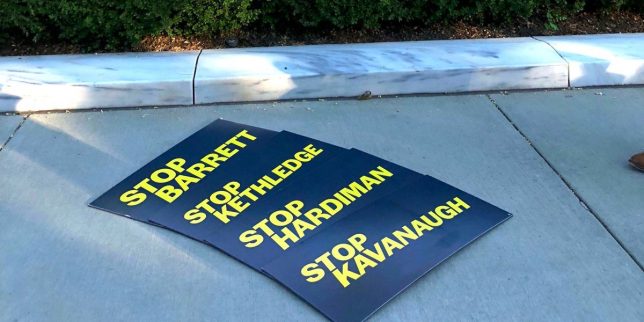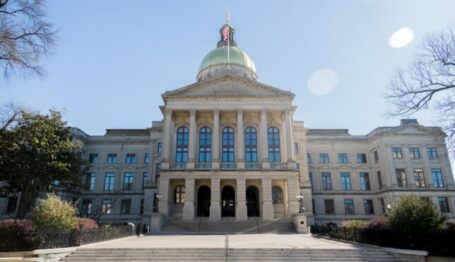Featured Items
2020 Dems Mum on Secret List of Judicial Nominees
 Signs prepared shortly before Brett Kavanaugh was nominated to fill the Supreme Court seat vacated by Justice Anthony Kennedy's retirement. Credit: Hayden Ludwig. License: Capital Research Center.
Signs prepared shortly before Brett Kavanaugh was nominated to fill the Supreme Court seat vacated by Justice Anthony Kennedy's retirement. Credit: Hayden Ludwig. License: Capital Research Center.

This article originally appeared in RealClearPolitics on June 14, 2019.
In 2016, then-candidate Donald Trump took the unusual step of pledging to choose his Supreme Court nominees from a list vetted and compiled by Leonard Leo, an outside adviser to Trump on the courts while on leave from the Federalist Society, and the Heritage Foundation.
That step provided Republicans wary of how Trump would govern with reassurance that their vote for him would have a substantial impact on the high court and tilt it to the right. The move was risky and unprecedented, but 2016 Election Day exit polls showed it paid off, with one out of every five voters saying that the makeup of Supreme Court was their top issue. Trump ended up winning 57% of those voters.
Liberal judicial activist groups announced earlier this week that they are working on a similar effort — compiling a list of progressive judges who would fill the courts if a Democrat wins the White House in 2020. Building the Bench, an initiative by the Alliance for Justice and other liberal organizations, will identify progressive judges they believe are best-suited to fill likely vacancies.
Democrats are counting on scores of lower court openings — seats held by senior judges appointed by Presidents Obama, Clinton and Carter who are waiting out the Trump administration to retire if a Democrat wins the presidency.
“We’ve launched #buildingthebench to make sure the next president won’t lose a minute when it comes to fixing the damage the Trump administration has done to our courts,” AFJ tweeted Thursday. AFJ is a 40-year-old organization that has played an instrumental role in every high-profile judicial battle since it successfully helped derail the Supreme Court nomination of Robert Bork in 1987.
But unlike Trump’s transparent 2016 move, the AFJ and the other groups involved are keeping their lists of judges secret, and no Democratic presidential campaign is willing to say it would use the list to select nominees.
RealClearPolitics reached out to a dozen of these campaigns to ask whether they would commit to selecting appointees from the Building the Bench roster, but only a handful responded to repeated requests – and those responses were noncommittal.
The campaigns of the top contenders in the field — Joe Biden, Bernie Sanders, Elizabeth Warren, Kamala Harris, Pete Buttigieg, Cory Booker, Amy Klobuchar, Kirsten Gillibrand and Julian Castro — did not respond to repeated inquiries about this topic.
Only Washington state Gov. Jay Inslee said he supports the AFJ initiative: “If he is the Democratic nominee, Governor Inslee would share his list of potential nominees,” his spokesperson told RCP.
Beto O’Rourke’s campaign spokesperson sidestepped a question about whether he would utilize an AFJ list or disclose his own lineup of potential judicial nominations during his campaign. “Beto believes that any nomination to the federal bench must show a commitment to the words written above the steps of the highest court in the land: ‘equal protection under the law,’” the spokesman said.
“The American people deserve justices who believe in voting rights, defend civil liberties for all including LGBTQ Americans, recognize a woman’s right to make decision about her own body, put people above corporations and protect working men and women.”
A spokesman for the John Delaney campaign said only, “We’re not putting forth a list at this time.”
The Andrew Yang campaign declined to comment.
The stakes are incredibly high for the future of the federal bench. President Trump and Senate Majority Leader Mitch McConnell have been furiously filling 100 judicial vacancies that existed when he took office — openings that existed because McConnell for years successfully blocked numerous Obama appointments.
Liberal activists want to counter that record and believe there are roughly 100 veteran judges poised to retire if a Democrat manages to deny Trump a second term, according a New York Times report on the push.
The secrecy surrounding the liberal roster of nominees who could fill these slots is drawing fire from the Trump campaign and conservatives.
AFJ and the Democratic presidential campaigns, these critics say, want to shroud their choices out of fear that the public might view some of them as too extreme and sideline their candidacies before they reach the starting gate.
The Trump camp this week called the Building the Bench secrecy a “head-in-the-sand strategy.”
“President Trump took a bold and unprecedented step in 2016 by releasing a list of highly qualified individuals for consideration for a seat on the Supreme Court under a Trump presidency,” campaign spokeswoman Erin Perrine told RealClearPolitics. “That list, and the seriousness with which candidate Trump took filling a possible vacancy, brought a new energy to the campaign.”
She added, “Americans care about who sits on the Supreme Court, so Democrats’ ‘head-in-the-sand’ strategy on this topic proves what we’ve known all along – they are afraid and ill-equipped to lead.”
Judicial Crisis Network Chief Counsel/Policy Director Carrie Severino earlier this week blasted AFJ on Twitter for promoting Building the Bench in the media while keeping the names on the list secret after Trump “made his public, campaigned on it & let the American people see the kind of judges he would appoint.”
“Shocking @nytimes story reveals left wing dark money groups working with Democrat pres candidates on a secret list of nominees for SCOTUS,” she tweeted. “Why are they hiding this list? Why are they scared to show the American people the kind of judges they want? #SecretList #StopHiding.”
Dark-money is a term used to describe political spending by certain nonprofit organizations that aren’t required to disclose their donors.
Alliance for Justice spokeswoman Laurie Kinney told RCP that the names being compiled will only be shared if a Democrat wins the 2020 election and is in the process of setting up his or her administration.
“Names will be shared with an incoming administration, not the nominee,” she told RCP in a statement. “And it would not be our prerogative to disclose any names. In fact, it was the Trump campaign that chose to release names of potential Supreme Court nominees — not another organization. So our two situations are very different; we are not a presidential campaign nor do we speak for one!”
She also said AFJ isn’t consulting or sharing potential names with Democratic presidential campaigns. Instead, she said the Building the Bench initiative is working with “nonprofits, rights advocates, unions and academics to identify a broad pool of diverse and highly qualified potential nominees.”
“The Trump administration has been packing the bench with individuals who are unfit and unqualified, and who have records of opposition to voting rights, workers’ rights, women’s rights, consumers’ rights, and more,” she said. “They also don’t reflect the diversity of our country – as of June 1, 2019, over 75% of federal judges confirmed under the Trump administration are male and almost 90% are white.”
Severino and other conservatives argue that Democrats have an obligation to share the recommended names because AFJ and other liberal groups are pushing to expand the number of justices on Supreme Court in order to counter Trump’s appointments, an idea backed by multiple 2020 Democratic presidential candidates.
“They want to pack the court and aren’t even willing to tell the American people who they are going to pack the courts with,” Severino tweeted.
Mike Davis, a former Republican Senate and White House aide who played a key role in the confirmations of Justices Neil Gorsuch and Brett Kavanaugh, argues that AFJ wants to keep its list secret “because the nominees on this list would scare the hell out the American voters.”
Davis runs his own dark-money group aimed at countering the Democrats’ hard-ball tactics when it comes to judicial nominations. Called the Article III Project — after the section of the Constitution that established the judiciary — the group was formed partly in response to the creation of Demand Justice, a progressive dark-money organization that promotes liberal judicial appointments and opposes Trump’s nominees.
AFJ and Democratic presidential campaigns “absolutely should disclose to the American people who is on their secret list,” Davis told RCP. “The types of judges they want to put on the federal bench is an important issue to voters – do they want judges who would apply the law as written or do they want liberal activist judges who would rewrite the laws because the American left can’t get the American people to support their radical agenda?”
A quick review of some members of Building the Bench’s advisory council offers a glimpse of the liberal criteria they might use in selecting nominees. For instance, Kimberle Crenshaw, a professor at UCLA and Colombia Law School, earlier this month referred to police officers as “killers/overseers” in a tweet about a Houston-area Hispanic officer fatally shooting a black woman (who reportedly suffered from mental illness) after she shocked him with a Taser.
Crenshaw also is widely credited with coining the term “intersectionality,” a legal concept about the cumulative nature of racism, sexism and other types of discrimination that a National Review article last year labeled “religion for deep-blue America.”
Another member of the advisory council, Melissa Murray, a professor at New York University School of Law, has defended the practice of drag queens reading to young children in schools. Murray recently argued on Twitter that “as a right-wing trope, family values has rarely been about actual families. It is, rather, a way of sanctifying gender hierarchies.”
She also has praised New York state’s expansive abortion law, which allows abortions up until the 24th week of pregnancy and removed abortion from the penal code, decriminalizing the practice.
Murray, like Crenshaw, also has repeatedly hit Joe Biden for over his role in the Anita Hill hearings 28 years ago, and has complained that he only apologized for reasons of political expediency.
Another council member, Harold Koh, the former dean of Yale Law School, defended Yale’s decision to bar military recruiters from its annual jobs fair. Under his leadership, Yale Law School (along with several other law schools) sued the military, taking issue with its refusal to “refrain from discrimination” against LGBTQ individuals in the recruiting process. After a district court ruled in favor of the plaintiffs, a federal appeals court reversed the decision.
Asked about these positions and whether most Americans would back them, AFJ’s Kinney said: “We’re very excited about our distinguished advisory council.”
Kinney also rejects the dark-money label, arguing that the term has been used to describe 501(c)(4) organizations’ funding and spending on electoral activities. But “AFJ is a 501(c)(3) and doesn’t engage in electoral activities,” she said.
Kinney didn’t respond when asked about reports that AFJ also operates a 501(c)(4) that isn’t required to disclose its donors.
In recent years, Democratic lawmakers have railed against dark-money conservative groups, lumping the Federalist Society into that mix, for what they regard as their outsized political influence.
In recent years, there’s also been plenty of liberal dark-money fueling judicial battles, with the intense partisan clash over Justice Brett Kavanaugh’s confirmation the latest clear example. A left-wing dark-money group, Demand Justice, is currently running digital ads in Iowa calling for packing the Supreme Court, and the group ran numerous ads opposing Kavanaugh’s confirmation.
Much of AFJ’s funding – money it receives from liberal billionaires and other wealthy donors – is somewhat opaque because the organization operates like a trade association. AFJ takes membership dues from 130 liberal organizations, including several unions, Planned Parenthood, NARAL, the Sierra Club, Earthjustice, AARP and Transgender Law Center.
It also accepts large-dollar contributions from anonymous donors, including lump-sum donations of $873,714 and $675,000 from unnamed individuals it simply describes as a “person” on its 2017 990 forms, posted on its website. That year, it also listed $962,919 worth of Berkshire Hathaway stock as “noncash property.”
The wife of Berkshire Hathaway CEO and Chairman Warren Buffett, through her Susan Thompson Buffett Foundation, as well as several other prominent left-of-center organizations have donated to the AFJ in recent years, according to the Capital Research Center. Those groups include the George Soros’ Open Society Foundations, the Ford Foundation and the California Endowment, among others.



